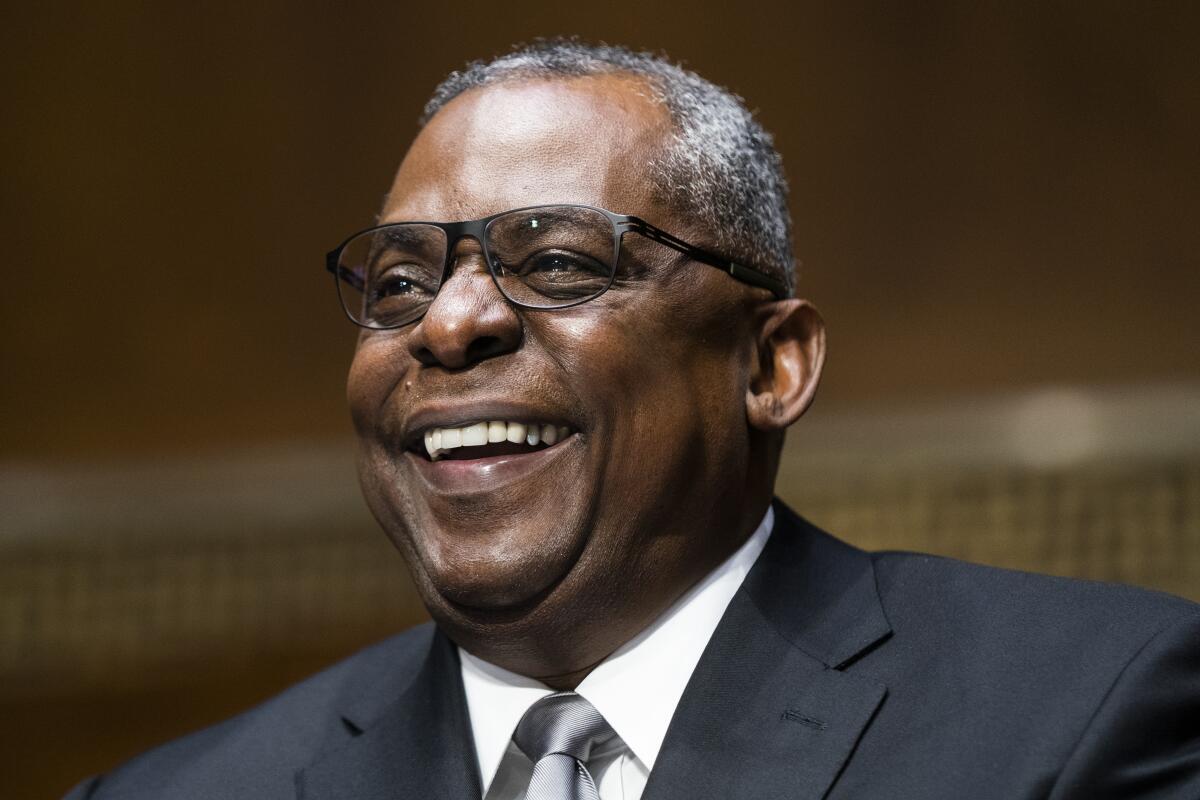Senate votes overwhelmingly to make retired Gen. Lloyd J. Austin III the Defense secretary

WASHINGTON — The Senate confirmed Lloyd J. Austin III as Defense secretary Friday, putting the first Black American in charge of the Pentagon by a nearly unanimous vote of 93 to 2.
Austin, a retired four-star Army general who commanded U.S. forces in the Middle East, becomes the second member of President Biden’s Cabinet to be approved by the Senate. Director of National Intelligence Avril Haines was confirmed Wednesday, after Biden’s swearing-in, and several other Cabinet members are likely to get confirmation votes soon.
Austin arrived at the Pentagon and was sworn in around noon, an hour after the Senate vote. He received a briefing on actions against the spread of COVID-19, and made clear that his immediate priority was expanding the military’s role in assisting the federal response to the pandemic.
“You have already come to the aid of our nation’s healthcare professionals. You can expect that mission to continue,” Austin said in a message to the sprawling department released by the Pentagon. “But we must help the federal government move further and faster to eradicate the devastating effects of the coronavirus.”
He also faces far-reaching decisions on whether to proceed with further troop drawdowns in Afghanistan, Iraq and Syria, and on focusing U.S. security strategy more on countering China in East Asia, which he has previously said will be one of his priorities. And Austin will have to work on easing tensions with allies in Europe and Asia over U.S. defense commitments; those relations frayed considerably under President Trump.
The new Pentagon chief was scheduled to receive an intelligence update and spoke by phone with NATO Secretary-General Jens Stoltenberg, who tweeted afterward that they had a “Great discussion about the values we share & the challenges we face. I look forward to working closely with him to strengthen the bond between Europe & North America through #NATO.”
Austin will also focus on rebuilding the civilian workforce at the Pentagon. In the Trump administration, many jobs remained vacant or were filled by acting officials who never were formally nominated and confirmed.
The Senate debate on Austin’s nomination was brief, lasting only 10 minutes. The two senators who voted against him were Republicans, Sens. Mike Lee of Utah and Josh Hawley of Missouri.
Austin’s speedy approval came despite some lawmakers’ concerns that putting a recently retired officer in charge of the armed forces might further weaken the nation’s principle of civilian control of the military. Austin reassured lawmakers that he understood his role as a civilian official would require him to be independent of the armed services in advising Biden.
The way was cleared for his confirmation Thursday, when the House and the Senate voted to waive a law that requires former officers to have been out of uniform at least seven years before they could become Defense secretary. Austin retired in 2016.
Austin is a “powerful symbol of the diversity and history of America’s armed forces,” Senate Majority Leader Charles E. Schumer (D-N.Y.) told the Senate before the vote. “Mr. Austin has a storied career in the Army but those days are behind him. As secretary of Defense he has promised to empower and lift up his civilian staff, and I believe he will be an outstanding secretary of Defense.”
Senate Minority Leader Mitch McConnell (R-Ky.) said Austin was “clearly qualified” and the “president should get real latitude” to pick “qualified mainstream people of their choosing.” He warned, however: “We emphatically do not want high-ranking military service to become a tacit prerequisite for civilian leadership posts over at the Department of Defense.”
McConnell suggested that the military ethic of staying out of political debates might not be the proper background for a Defense secretary, who is expected to advocate forcefully in national security debates.
The former general is the second recently retired officer in four years to take over the Pentagon. Retired Marine Gen. James N. Mattis was Trump’s first Defense secretary and also required a waiver. The law restricting former officers from the job had previously been waived only once in 70 years.
A native of Georgia, Austin emerged as a surprise choice for the Pentagon and has said he did not expect to be chosen. When Biden was vice president, he had gotten to know Austin and turned to him in part because of that existing relationship, associates said. He came to admire Austin’s publicity-averse style and willingness to carry out White House decisions loyally, even if he disagreed with them, they added.
Biden and Austin worked closely on a U.S. troop drawdown in Iraq in 2010 and 2011, when Austin was a commander in Baghdad and recommended that President Obama keep as many as 24,000 troops in Iraq. The White House, including Biden, opposed the plan.
Austin also worked with Biden’s late son, Beau, who served on the general’s staff in Iraq, attended Mass with him, and stayed in touch following their deployments, before Beau Biden died of a brain tumor in 2015 — an important bond with Biden.
Janet Yellen, Biden’s pick to head the Treasury Department, is expected to be easily confirmed next week. On Friday, her nomination was approved unanimously by the Senate Finance Committee. She was the first woman to head the Federal Reserve and, if confirmed, would be the first woman to be Treasury secretary.
McConnell said a Senate vote on the nomination of Antony Blinken, Biden’s longtime advisor and his nominee as secretary of State, also would be delayed until next week. Blinken, too, is expected to be confirmed easily.
More to Read
Get the L.A. Times Politics newsletter
Deeply reported insights into legislation, politics and policy from Sacramento, Washington and beyond. In your inbox three times per week.
You may occasionally receive promotional content from the Los Angeles Times.











